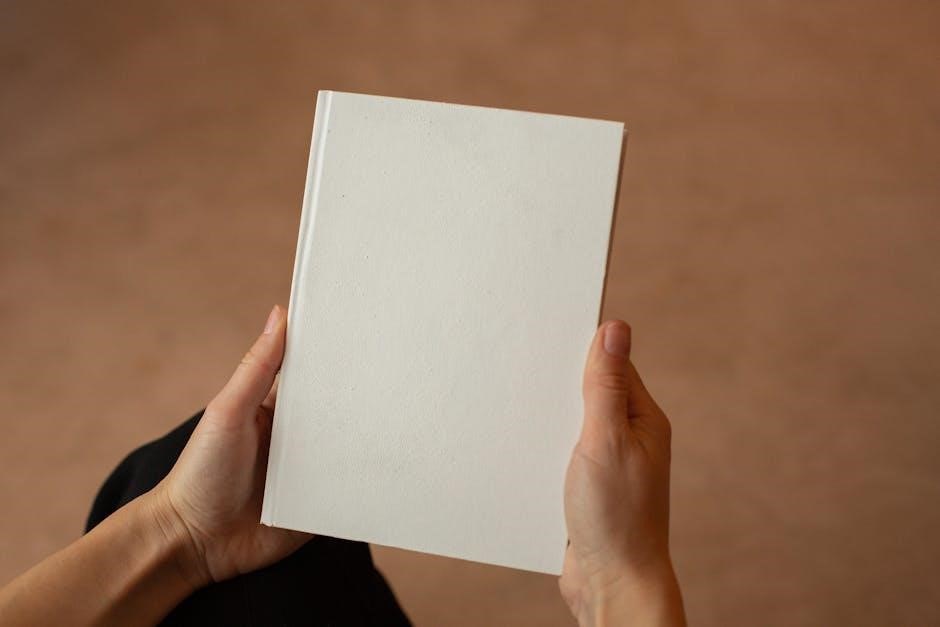Daphne du Maurier’s Rebecca is a captivating Gothic novel published in 1938‚ exploring themes of marriage‚ identity‚ and secrets through its unnamed narrator’s haunting journey.
1.1 Overview of the Novel’s Significance
Rebecca is a landmark Gothic novel‚ celebrated for its psychological depth and haunting atmosphere. Published in 1938‚ it explores themes of love‚ identity‚ and secrets‚ captivating readers with its mysterious narrative. The novel’s enduring popularity lies in its ability to blend romance with suspense‚ making it a timeless classic in world literature.
1.2 Historical Context and Publication
Rebecca was published in 1938‚ a period marked by global turmoil. Daphne du Maurier drew inspiration from her own life and the era’s societal changes. The novel’s release coincided with rising tensions in Europe‚ yet its timeless themes resonated universally. Its success solidified du Maurier’s reputation as a master of Gothic fiction‚ leaving a lasting impact on literature.
Plot Summary of “Rebecca”
A young‚ unnamed narrator marries the wealthy Maxim de Winter and moves to his estate‚ Manderley‚ where she confronts the haunting legacy of his late wife‚ Rebecca.
2.1 The Story’s Narrative Structure
The novel employs a non-linear narrative‚ beginning with the narrator’s nostalgic reflection of Manderley. Through flashbacks‚ the story unravels the mysterious events surrounding Rebecca’s death and the narrator’s marriage to Maxim. This structure builds suspense and intertwines past and present‚ creating a vivid psychological landscape that keeps readers engaged and curious about the unfolding drama.
2.2 Key Plot Points and Twists
The narrator marries Maxim de Winter‚ a wealthy widower‚ and moves to his estate‚ Manderley‚ where Rebecca’s memory dominates. A series of revelations expose Rebecca’s infidelity and her tragic death. The discovery of her sunken boat and the truth about her demise shock the narrator‚ leading to a climactic confrontation with Rebecca’s loyal servant‚ Mrs. Danvers‚ and a devastating fire that destroys Manderley.

Why “Rebecca” is Considered a Classic
Daphne du Maurier’s Rebecca is a timeless classic due to its psychological depth‚ gothic atmosphere‚ and universal themes of love‚ identity‚ and secrets‚ ensuring its enduring popularity and literary significance.
3.1 Gothic and Psychological Elements
Daphne du Maurier masterfully weaves Gothic and psychological elements in Rebecca‚ creating a haunting atmosphere through Manderley’s grandeur and the mysterious death of its former mistress. The novel’s psychological depth explores the narrator’s obsession with Rebecca‚ the oppressive past‚ and the manipulative dynamics between characters‚ crafting a suspenseful and unsettling tale that transcends time‚ solidifying its place as a literary masterpiece.
3.2 Universal Themes and Appeal
Rebecca’s enduring appeal lies in its universal themes of love‚ jealousy‚ and self-discovery. The novel’s exploration of identity‚ marriage‚ and societal expectations resonates deeply with readers. Its psychological complexity and timeless human emotions transcend generations‚ making it a beloved classic that continues to captivate audiences‚ ensuring its relevance in modern discussions of literature and human nature. Its broad appeal has cemented its status as a timeless masterpiece.
Daphne du Maurier and Her Writing Style
Daphne du Maurier’s writing is renowned for its atmospheric and gothic undertones‚ blending psychological depth with vivid settings‚ creating complex characters and immersive narratives that captivate readers.
4.1 The Author’s Background and Influences
Daphne du Maurier was born in 1907 into a creative family‚ with her father a prominent actor and her mother an actress. Her upbringing in a literary household fostered her passion for storytelling. Du Maurier’s experiences as a woman in a male-dominated society and her travels significantly influenced her writing‚ shaping the atmospheric and psychological elements in Rebecca. The novel reflects her ability to weave personal experiences into compelling narratives‚ creating a legacy that continues to captivate readers worldwide.
4.2 Her Unique Approach to Storytelling
Daphne du Maurier’s storytelling in Rebecca is marked by a masterful blend of suspense and psychological depth. The novel’s unnamed narrator creates intimacy‚ while the non-linear narrative structure builds tension. Du Maurier’s use of atmospheric descriptions‚ particularly of Manderley‚ immerses readers in the story. Her exploration of complex emotions and secrets sets Rebecca apart as a gothic masterpiece‚ ensuring its enduring appeal.

Major Themes in “Rebecca”
Rebecca delves into themes of love‚ marriage‚ and identity‚ highlighting the psychological effects of secrets and memory. Justice and morality are central‚ shaping the narrative’s tension and character dynamics‚ making it a timeless exploration of human complexities.
5.1 Love‚ Marriage‚ and Identity
In Rebecca‚ love and marriage are entwined with identity‚ as the unnamed narrator navigates her union with Maxim de Winter. Her struggle to define herself amidst the shadow of Rebecca reveals the complexities of love‚ societal expectations‚ and self-discovery. The novel portrays how marriage can both empower and suffocate‚ shaping the narrator’s quest for belonging and individuality.
5.2 Secrets‚ Memory‚ and Justice
In Rebecca‚ secrets and memory intertwine to reveal truths about the past‚ shaping the characters’ lives. The narrator uncovers hidden truths about Rebecca and Maxim‚ exposing lies that define their relationship. Memory serves as both a burden and a catalyst for justice‚ as the past haunts Manderley. The novel questions the fairness of justice‚ leaving readers to ponder the moral consequences of secrets and their enduring impact.
The Role of Setting in the Novel
Manderley‚ the grand estate‚ serves as a central character‚ shaping the novel’s atmosphere and reflecting the characters’ emotional states. Its Gothic grandeur and haunting beauty create a tense‚ foreboding mood‚ deeply influencing the plot and the narrator’s experiences.
6.1 Manderley as a Character in Itself
Manderley‚ the grand estate‚ emerges as a central character‚ its Gothic grandeur and mysterious decay shaping the novel’s tension. The house‚ with its secret rooms and hidden histories‚ mirrors the narrator’s emotional journey. Its imposing presence and ever-shifting atmosphere symbolize the unraveling of secrets‚ making it a living‚ breathing entity that deeply influences the plot and characters.
6.2 The Use of Atmosphere and Description
Daphne du Maurier masterfully crafts a vivid‚ oppressive atmosphere through her descriptions of Manderley and its surroundings. The estate’s grandeur and decay are juxtaposed‚ creating a sense of foreboding. The narrator’s descriptions of the house and landscape mirror her psychological state‚ evoking feelings of isolation and unease. This rich imagery immerses readers in the novel’s haunting world‚ enhancing its Gothic and mysterious tone.

The Character of Rebecca and Her Impact
Rebecca‚ Maxim’s deceased wife‚ exerts a powerful influence through her absence. Her memory dominates Manderley‚ shaping the narrator’s insecurities and perceptions of her marriage‚ revealing a complex legacy.
7.1 Rebecca’s Presence Throughout the Story
Rebecca’s presence permeates the narrative‚ though she is deceased. Her memory lingers in Manderley‚ influencing the narrator’s perceptions and interactions. The housekeeper‚ Mrs. Danvers‚ perpetuates Rebecca’s legacy through eerie reminders‚ creating an unsettling atmosphere. The narrator’s journey is overshadowed by Rebecca’s ghostly influence‚ shaping her identity and marriage‚ as she struggles to fill the void left by her predecessor.
7.2 The Psychological Effect on the Narrator
Rebecca’s presence deeply impacts the narrator‚ fostering feelings of inadequacy and anxiety. The narrator’s identity is overshadowed by Rebecca’s legacy‚ heightened by Mrs. Danvers’ eerie devotion. The oppressive atmosphere of Manderley amplifies the narrator’s mental turmoil‚ as she grapples with her husband’s past and her own insecurities‚ creating a haunting psychological struggle to assert her place in the marriage and the mansion.

Adaptations and Interpretations of “Rebecca”
Rebecca has been adapted into numerous films‚ plays‚ and interpretations‚ with Alfred Hitchcock’s 1940 adaptation being the most iconic. Its enduring appeal continues to inspire new adaptations and reimaginations.
8.1 The 1940 Film Adaptation by Hitchcock
Alfred Hitchcock’s 1940 adaptation of Rebecca starring Joan Fontaine and Laurence Olivier remains a landmark in cinematic history. It was Hitchcock’s first Hollywood film‚ earning the Academy Award for Best Picture. The movie masterfully captures the novel’s psychological tension and gothic atmosphere‚ with striking cinematography and lighting. Though it deviates slightly from the novel‚ focusing more on Maxim’s perspective‚ it retains the eerie essence of Manderley and Rebecca’s haunting legacy.
8.2 Stage Productions and Other Adaptations
Rebecca has been adapted into numerous stage productions‚ including a notable 2021 English-language premiere at the Charing Cross Theatre in London. These adaptations highlight the novel’s enduring appeal‚ capturing its gothic atmosphere and psychological depth. Additionally‚ various radio plays‚ television series‚ and even operas have reimagined the story‚ ensuring its timeless resonance across different mediums and audiences.
Study Guides and Resources for “Rebecca”
Study guides like LitCharts and SparkNotes offer detailed summaries‚ character analyses‚ and discussion questions. Resources provide historical context and tools for deeper understanding of the novel.
9.1 Available Study Guides and Summaries
Various study guides and summaries for Rebecca are available‚ including resources from LitCharts and SparkNotes. These guides provide detailed plot summaries‚ character analyses‚ and explorations of themes like love and identity. They also offer discussion questions and historical context‚ helping readers and students deepen their understanding of the novel’s complex narrative and psychological depth.
9.2 Analytical Tools for Understanding the Novel
Analytical tools like literary essays‚ character maps‚ and theme trackers help dissect Rebecca’s complexities. Critical essays explore the novels psychological depth‚ while resources from platforms like LitCharts offer structured analyses. These tools enable readers to examine motifs‚ character dynamics‚ and symbolic elements‚ providing a deeper understanding of the novels intricate narrative and its exploration of identity‚ memory‚ and justice.
Cultural Impact and Legacy
Daphne du Maurier’s Rebecca has left an indelible mark on literature‚ inspiring adaptations and influencing modern storytelling through its timeless themes and atmospheric brilliance.
10.1 The Novel’s Influence on Popular Culture
Rebecca has profoundly shaped popular culture‚ inspiring numerous adaptations‚ including films‚ stage productions‚ and even modern retellings. Its gothic suspense and psychological depth have influenced authors and filmmakers‚ making it a cornerstone of thriller narratives. The novel’s iconic imagery‚ such as Manderley and the enigmatic Rebecca‚ continues to captivate audiences‚ ensuring its lasting relevance in contemporary media and storytelling.
10.2 Its Enduring Popularity and Appeal
Rebecca remains a timeless classic‚ captivating readers with its haunting narrative and universal themes. The novel’s exploration of love‚ jealousy‚ and identity resonates deeply‚ while its gothic atmosphere and psychological complexity continue to enthrall audiences. Its enduring popularity is evident in its consistent presence in literature and popular culture‚ making it a must-read for generations of book lovers worldwide.
Rebecca by Daphne du Maurier remains a timeless masterpiece‚ blending gothic suspense with psychological depth. Its exploration of love‚ identity‚ and secrets ensures its enduring appeal and influence.
11.1 The Lasting Significance of “Rebecca”
Daphne du Maurier’s Rebecca endures as a literary masterpiece‚ blending Gothic suspense with profound psychological insight. Its exploration of identity‚ marriage‚ and secrets resonates universally‚ while its atmospheric setting and complex characters continue to captivate readers. The novel’s influence on literature and popular culture remains undeniable‚ ensuring its relevance in modern times as a timeless tale of love and mystery.
11.2 Recommendations for Further Exploration
For deeper insight into Rebecca‚ readers can explore Daphne du Maurier’s other works like My Cousin Rachel and Jamaica Inn. Watching the 1940 Hitchcock film adaptation offers a visual interpretation of the novel. Additionally‚ study guides and critical analyses provide rich context‚ while essays on the novel’s psychological themes enhance understanding of its enduring appeal and literary significance.
